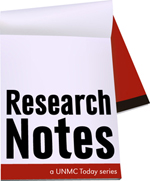 A therapy to improve sleep quality and reduce fatigue in patients undergoing breast cancer treatment does improve sleep but doesn’t significantly reduce fatigue, a study led by a UNMC researcher shows.
A therapy to improve sleep quality and reduce fatigue in patients undergoing breast cancer treatment does improve sleep but doesn’t significantly reduce fatigue, a study led by a UNMC researcher shows.
These findings were made by a team led by Ann Berger, Ph.D., UNMC College of Nursing professor and Dorothy Hodges Olson Endowed Chair in Nursing and were published in the Nov. 2 Journal of Clinical Oncology.
The results came from a five-year, $1.5 million study funded by the National Institutes of Health.
|
Fatigue, however, proved to be a more persistent problem, Dr. Berger said.
“We found that adequate sleep isn’t the only answer to reducing fatigue,” he said. “Poor sleep contributes to fatigue, but it’s not the only thing.”
Dr. Berger’s study was the first to test in depth, a nursing intervention designed to reduce fatigue during and after chemotherapy without using drugs. It also was the first time the sleep interventions were tested in people with cancer.
Sleep problems and fatigue from breast cancer treatment cause some women to quit therapy.
The study will help provide a benchmark to identify who is at greatest risk for persistent fatigue and sleep problems after treatment.